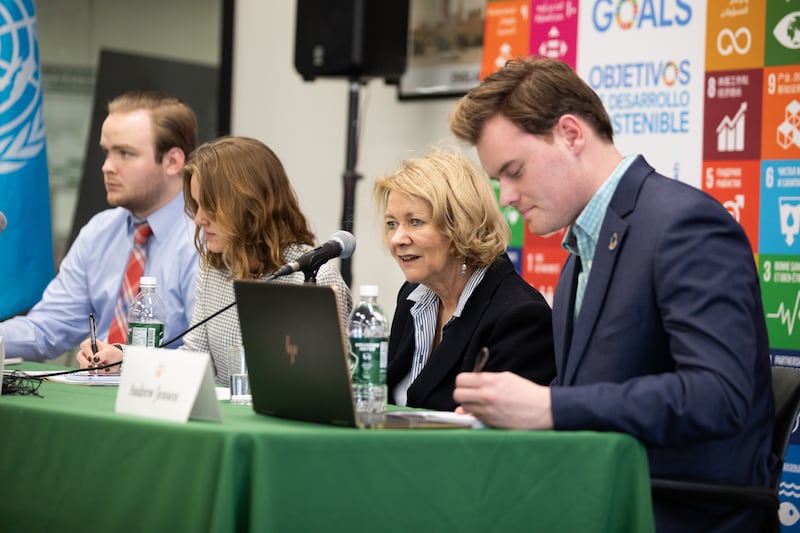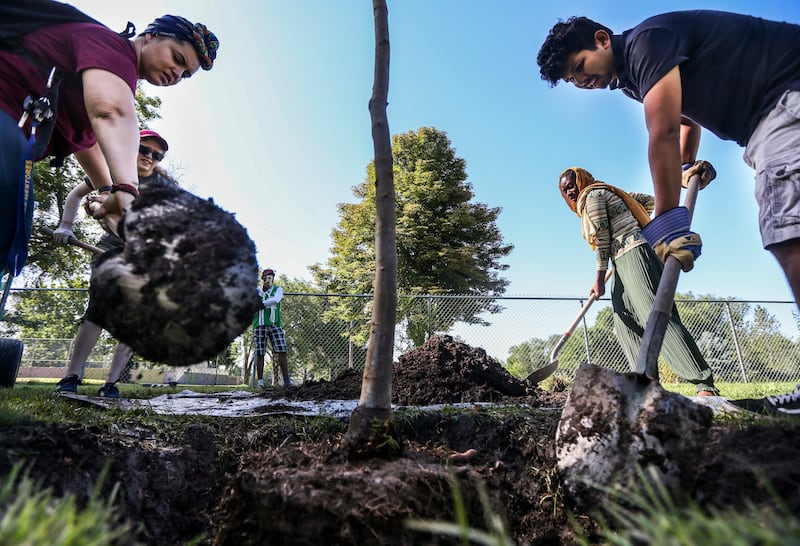SALT LAKE CITY — Almost half of the 6,000 attendees to a United Nations conference here next week will be young adults from 138 countries. But the large contingent of youth and the meeting’s location in the Mountain West will carry the same gravitas of previous gatherings at U.N. headquarters in Manhattan.
Indeed, the selection of Utah’s capital and heavy involvement of youth in planning and participating in the 68th Annual United Nations Civil Society Conference makes a statement.

“In visiting Salt Lake City I was struck by the rapid growth and innovation there, symbolized by the construction cranes dotting the beautiful mountain landscape, and by the sense of opportunity as young people flock to the region for its educational and job offerings. It is a great setting for a global conversation on inclusion and sustainability in cities and communities of all sizes,” Alison Smale, United Nations under-secretary general for global communications, said in the statement.
The three-day conference marks the first time it has been held outside of New York when the United States has been host. Paris, Mexico City and Melbourne, Australia, are among cities that have hosted the conference in the past.
This year’s event will focus on sustainable cities and communities. The topic is among the 17 sustainable development goals the U.N. General Assembly adopted in 2015. Others include ending hunger and poverty, reducing inequality, and promoting decent work and economic growth — all to be achieved by 2030.
“The Sustainable Development Goals are a global framework for cooperation to tackle the great challenges of our day,” said Maruxa Cardama, conference chairwoman and secretary general of the non-governmental organization Partnership on Sustainable Low Carbon Transport. “Cities are growing so quickly that it is imperative we build them thoughtfully and make extra efforts to ensure that no person or group is left behind.”
More than half (55%) of the world’s population lives in urban areas and that figure is expected to reach 68% by 2050, according to the U.N. The conference is intended to help government and nongovernment leaders find sustainable solutions to poverty, housing, hunger and health, clean water, energy, climate change, infrastructure, transportation, education, migration, violence and gender equality.
More than 90 percent of Utah’s population lives along the densely populated Wasatch Front corridor, with Salt Lake City located near the midpoint of the more than 100-mile stretch of cities and towns connected by roads and transit systems.
Conference organizers were persuaded by Salt Lake City officials that the city’s efforts to tackle many of the issues the conference will address make it an ideal location.
“With everything we are doing to build a sustainable and resilient city, from investing in more equitable transit and housing to becoming a clean energy city — Salt Lake City is the perfect place to have these important conversations,” Mayor Jackie Biskupski said.
It will be one of the largest international events the city has hosted since the 2002 Winter Olympics.
“It’s fitting that the U.N. is holding this here in that Utah is recognized globally as a place with a robust free market economy and civil society,” said Deseret News Opinion Editor Boyd Matheson. He will moderate a panel discussion on how faith groups and other nongovernmental entities can offer people upward mobility, or opportunities to improve their economic situation.

Youth movement
The annual conference used to be heavily focused on the work of non-governmental organizations — nonprofit agencies engaged in humanitarian, educational, health, human rights and environmental endeavors.
But a U.N. reorganization and renaming of departments and sections resulted in changing the name to Civil Society Conference, which better describes the broader group of stakeholders involved, including young adults, said Annie Deng, co-chairwoman for the Outcomes Sub-committee and sub-task lead on the Youth Declaration for the conference.
Biskupski said the city made an intentional effort to recruit youth in the planning and carrying out of the conference. In fact, a record 43 percent of the attendees will be 32 years old or younger, she said.
“We want this younger group to be at the table and having their voices heard because they are living with these issues today.”
“We like 32 years because that is the average age” of the world population, she said. “We want this younger group to be at the table and having their voices heard because they are living with these issues today.”
Vlada Yeramenko, 23, is among the dozens of local college students who got involved in organizing events for the conference. A native of Ukraine who graduated in May from the University of Utah with a bachelor’s degree in international relations, she said her academic interests and her personal experience as an immigrant inspired her to get involved.
Her mother’s marriage brought Yeramenko to the United States when she was 15. She spoke little English, but a welcoming community in Sante Fe, New Mexico, helped her assimilate, develop her skills as a violinist and eventually find her passion in international relations.
“This is a conference for everyone to feel included, and then to work to find solutions to the problems that we’re facing right now,” she said.
The young adults are also injecting an element of fun with their work. Before attendees begin three days of speeches and absorbing information from about 200 workshops, youth planners put together events on Saturday where they will be planting trees, cleaning up a section of the Jordan River, relaxing to yoga and discussing the U.N.’s sustainable development goals.
The conference will include youth-led workshops and unveil a Youth Climate Compact that was drafted with input submitted before the conference from young adults around the world, said Deng.
The lengthy document lists nearly two dozen action items — ranging from recycling and consumption awareness to divesting in fossil fuels businesses and converting to renewable energy sources — that youth pledge to do to “unite in action against the climate crisis.”

Sustainable cities
Biskupski said the city’s negotiated agreement with Rocky Mountain Power in 2016 to provide 100% renewable energy by 2032 was a factor that caught the attention of U.N. officials reaching out to Salt Lake.
“That made news across the country because cities had not been able to get their energy providers to really move the needle on going to 100% renewable,” she said.
The city’s investment in affordable housing, transit development and infrastructure were other components to its proposal that won over the U.N. a year ago this month.
Another factor is the state’s involvement in humanitarian work, said Baldomero Lago, chief international officer for Utah Valley University, who first suggested to U.N. officials that they reach out to Salt Lake, the Deseret News reported in March. He had access to U.N. officials through after his Utah Valley United Nations, a group of humanitarian relief groups, business and faith-based groups, gained U.N. accreditation.
“We talk about sustainability, but it is the humanity that actually makes things happen to sustain the world that we live in,” Lago said in November, when the city announced it was hosting the conference.
Also at that announcement was Ahmad Corbitt, a director in the public affairs Department of The Church of Jesus Christ of Latter-day Saints, who added that cities are sustained first and foremost by residents’ willingness to give of themselves.
The church is offering that opportunity at the conference. Its U.N.-affiliated Latter-day Saint Charities is partnering with Feeding Children Everywhere, American Airlines, JustServe and conference participants to assemble 375,000 meals for needy children during the three-day event.
Latter-day Saint Charities Director Sister Sharon Eubank will also sit on a conference panel in a Tuesday session titled Civil Society Monitoring. Bishop Gérald Causeé, presiding bishop of The Church of Jesus Christ of Latter-day Saints, will offer brief remarks at the conference’s closing plenary session on Wednesday.
Correction: An earlier version incorrectly stated that the United Nation’s Civil Society Conference is the largest international event Salt Lake City has hosted since the 2002 Winter Olympics. It is one of the largest the city has hosted since the Olympics.


 alt=Matthew Brown
alt=Matthew Brown